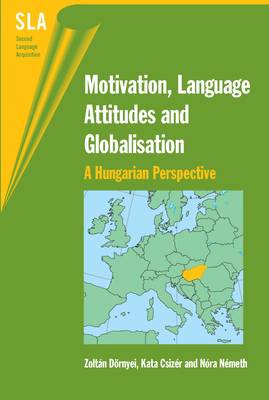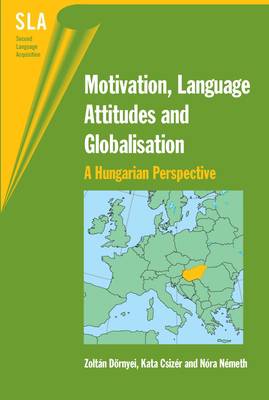
- Afhalen na 1 uur in een winkel met voorraad
- Gratis thuislevering in België vanaf € 30
- Ruim aanbod met 7 miljoen producten
- Afhalen na 1 uur in een winkel met voorraad
- Gratis thuislevering in België vanaf € 30
- Ruim aanbod met 7 miljoen producten
Motivation, Language Attitudes and Globalisation
A Hungarian Perspective
Zoltán Dörnyei, Kata Csizér, Nóra NémethOmschrijving
This volume presents the results of the largest ever language attitude/motivation survey in second language studies. The research team gathered data from over 13,000 Hungarian language learners on three successive occasions: in 1993, 1999 and 2004. The examined period covers a particularly prominent time in Hungary's history, the transition from a closed, Communist society to a western-style democracy that became a member of the European Union in 2004. Thus, the book provides an 'attitudinal/motivational flow-chart' describing how significant sociopolitical changes affect the language disposition of a nation. The investigation focused on the appraisal of five target languages - English, German, French, Italian and Russian - and this multi-language design made it also possible to observe the changing status of the different languages in relation to each other over the examined 12-year period. Thus, the authors were in an ideal position to investigate the ongoing impact of language globalisation in a context where for various political/historical reasons certain transformation processes took place with unusual intensity and speed. The result is a unique blueprint of how and why language globalisation takes place in an actual language learning environment.
Specificaties
Betrokkenen
- Auteur(s):
- Uitgeverij:
Inhoud
- Aantal bladzijden:
- 224
- Taal:
- Engels
- Reeks:
- Reeksnummer:
- nr. 18
Eigenschappen
- Productcode (EAN):
- 9781853598869
- Verschijningsdatum:
- 12/04/2006
- Uitvoering:
- Hardcover
- Formaat:
- Genaaid
- Afmetingen:
- 152 mm x 234 mm
- Gewicht:
- 476 g

Alleen bij Standaard Boekhandel
Beoordelingen
We publiceren alleen reviews die voldoen aan de voorwaarden voor reviews. Bekijk onze voorwaarden voor reviews.











